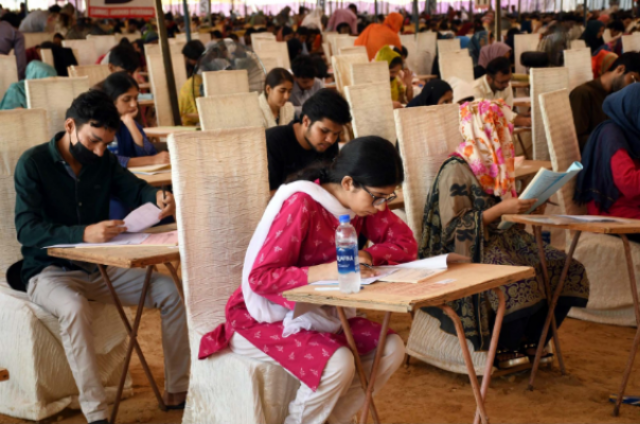KARACHI:
Female candidates overwhelmingly dominated this year’s Medical and Dental College Admission Test (MDCAT 2025), with three times as many girls as boys coming from Karachi. Out of 10,296 registered candidates, 7,767 were women and 2,529 were men.
Education experts said the trend reflected young women’s growing passion for the medical profession and their consistent academic excellence in intermediate exams.
The exam was held on Sunday at just two centers in Karachi – Dow University’s Ojha campus and NED University – a move that drew criticism from parents and students who complained of inadequate arrangements.
Candidates were scheduled to report at 6:30 a.m., but the three-hour newscast began at 10 a.m., forcing thousands of people to queue for hours under the open sky.
Parents described the situation as disorganized and distressing, especially as traffic jams caused by the ongoing BRT project near NED University have made access to the centers difficult. “We left the house before dawn but waited for hours just to enter,” said a student from Gulshan-e-Hadeed. Parents have urged authorities to suspend traffic or designate alternative routes during these major exams.
Across the country, the Pakistan Medical and Dental Council (PMDC) reported that 140,125 candidates appeared for MDCAT 2025 for 22,000 seats in public and private colleges.
In Sindh, 32,917 candidates registered – including 22,098 women and 10,819 men – reaffirming the continued dominance of women in medical education. At NED University, 4,003 girls and 1,197 boys attended, while Dow University had 3,764 girls and 1,332 boys.
The test consisted of 15% easy questions, 70% moderate questions and 15% difficult questions. There were no negative marks and candidates were allowed to take their questions home.
Strict security and surveillance were maintained at both centers, including biometric verification, metal detectors and CCTV monitoring. The questionnaires were unsealed using a five-step security protocol, with even transport vehicles equipped with cameras.
Medical camps have also been set up to help students suffering from stress, fatigue or low blood pressure.
According to Dr Abeera of DHO District East, 147 candidates – mostly women – were treated for headaches, nausea and weakness during the exam. Health Secretary Rehan Baloch also visited the site to review the arrangements. Despite these measures, parents and students said mismanagement had overshadowed the entire exercise. Only one entry gate was opened at Dow’s Ojha campus, creating chaos and crowds. Many parents, not knowing the location of the gate, struggled to reach it in time.
Students complained that only two centers for a city the size of Karachi was unreasonable. Those coming from remote localities such as Lyari, Keamari and Landhi said they faced high transport fares and long waits. “We paid Rs 9,000 for the exam but had to wait for hours,” said Fizza from Korangi, who appeared for MDCAT for the second time.
In NED, ongoing construction work and lack of pedestrian bridges have made it difficult for candidates to cross roads safely. “Students were seen walking through construction sheds just to get to the center,” another parent said.
Despite logistical issues, many students described the paper as fair and well-balanced. Others, however, said that some chemistry questions were difficult and that the heat inside the rooms made it difficult to concentrate.
Sukkur IBA testing service provided all stationery and oversaw logistics. Cell phones, smart watches and electronic devices were strictly prohibited. Police, traffic officers and emergency crews were deployed outside both centers, but parents said crowd management remained poor.
The PMDC has announced that the MDCAT 2025 results will be declared within a week, with rechecking service available within three days of the results being released. A detailed analytical report will be submitted within 10 days.
The council also clarified that it will not oversee admissions, which will be managed by universities and provincial authorities, ensuring that the entire process will remain transparent and based on merit.




